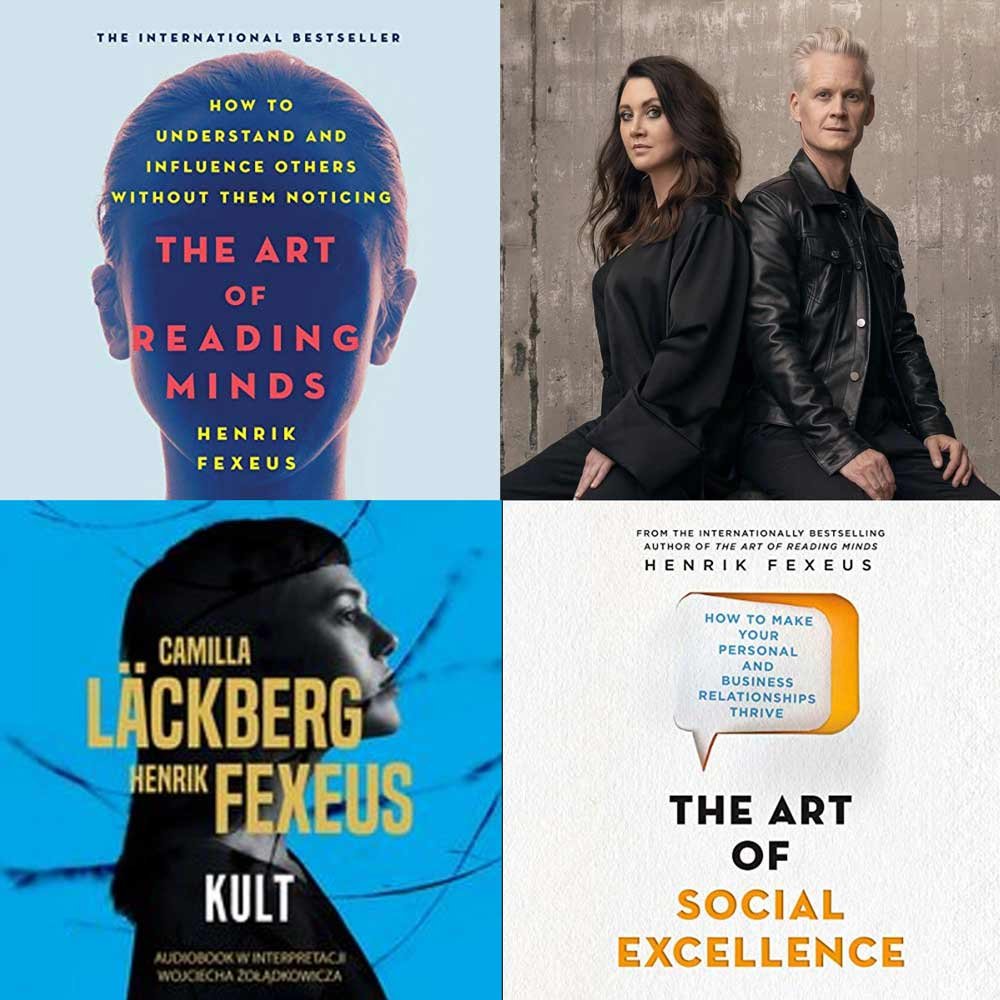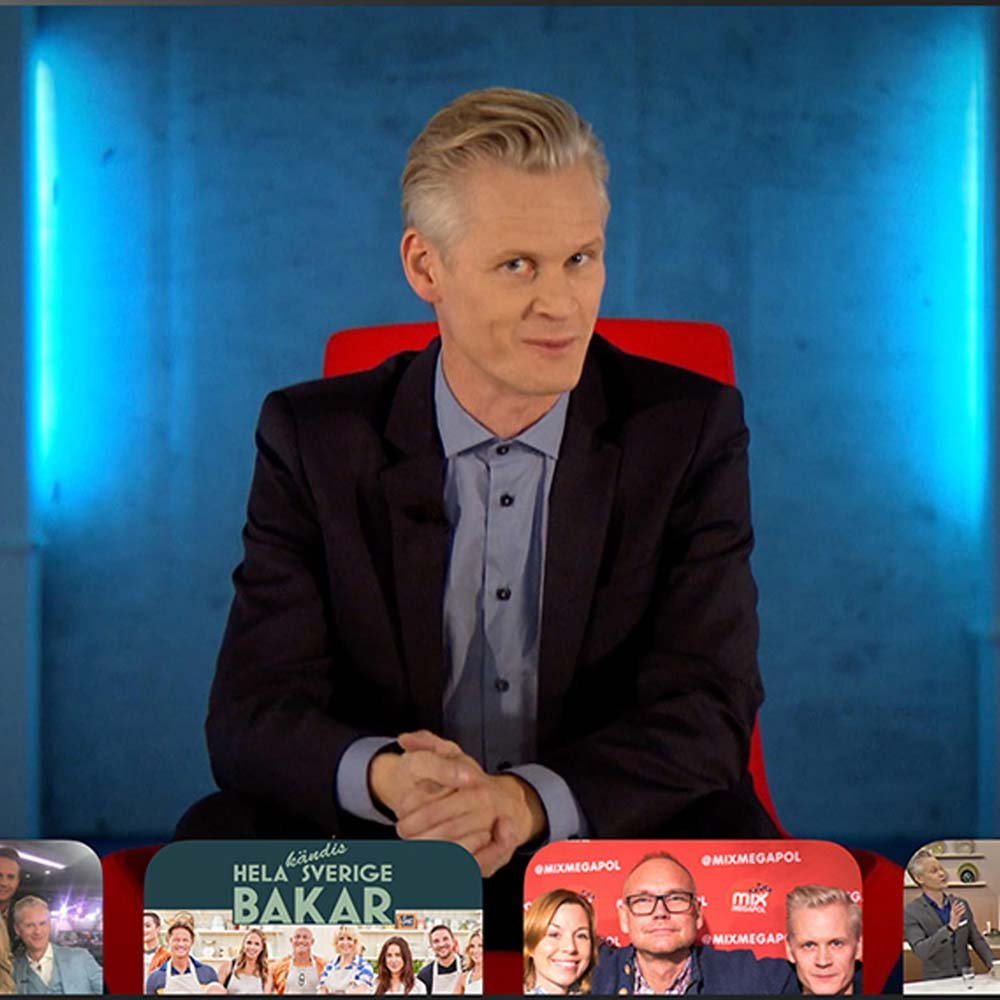Henrik Fexeus is an internationally bestselling author, lecturer, performer, and star of the TV show Mind Melt. An expert in psychology and communications, he travels the world "reading minds" and teaching others how to understand and manipulate human behavior through body language and persuasion. Henrik has studied mental skills like NLP, hypnosis, acting, and magic.
THE CREATIVE PROCESS
Being a mentalist, it's a field that not many of us know about. What is a mentalist? It’s kind of like a magician? Tell us drew you to this?
HENRIK FEXEUS
A mentalist is a kind of magician, an illusionist. And a mentalist uses whatever techniques are at that person's disposal to create the illusion of being able to read minds or being able to contact a supernatural presence...
The only rule is that that part is fake, but then you can use techniques for magic or from stagecraft or from psychology. A mentalist is really someone who creates this illusion of having an almost supernatural ability. Having said that, today a mentalist sort of has come to mean something else, mainly due to popular culture TV series like The Mentalist and so on. And now there's this understanding of a mentalist as someone being able to read body language and influence behavior. It sort of ties into it all. And I've had a lifelong passion for magic, and it started when I was seven. Because I was always interested in the question: what if there's a color in the sky that we can't see? What if a handkerchief actually can vanish? What does that mean in terms of how the world works?
So that was one part of it. I always longed for there to be something else. And I think one of the reasons for that was because I was quite the socially awkward child. I didn't have the skill set to interact in a frictionless way with my classmates, which meant that I was a weird guy. I was the one who got beaten up every single day at school, but I was also quite extroverted. So I didn't confine myself to my place in the corner. I was still there every Friday because on Fridays there was an open hour in class where you can perform or just show something. And I was always there to do magic because I had a skill. I could do something that the other guys couldn't. And then they beat me up again for it. But I do think that that realization that there's something going on here, that sort of set off something in my mind that this is something I needed to solve.
I wanted to understand my bullies. How come these persons, because of course they weren't a hundred percent evil, but they were my friends, and then suddenly they became evil? What happened? How can, you know, a normal 10-year-old or 15-year-old suddenly beat up someone else who he was just friends with? This wasn't a conscious reflection on my part, but it was there. It basically felt like everyone else had been handed a handbook on social intelligence.
THE CREATIVE PROCESS
So when you are writing with Camilla Läckberg, can you describe that process for us? How do your books come together?
FEXEUS
The thing is, we didn't know either because both Camilla and I, we don't like working with other people. So how do we do this now that there are two of us? And so the way the story came about was that I had this idea about a mentalist - Vincent. And I had this ordeal that I wanted to put him through, and I discussed it with Camilla, who's always been a long-time friend, and she added some ideas and then we realized that, Oh, hang on, we actually have something together here. So then we needed to write it together.
Some people assume that it's Camilla writing, and I'm sort of providing her with information, but that's not how it is at all. What we've been doing is that since we had sort of the overall structure, we meet once a week and then we look at, Okay, where are we now? What are our characters doing and what do they need to do next? So we find like 10 scenes. We don't call them chapters because most of the time they're not. But they are scenes that need to happen. And then she goes away and writes five of them. And I go away, and I write five of them. And if she just wrote about some of the police personnel perhaps in the book, then it's my turn to write about the police. If I wrote about the mentalist, then she's going to write about the mentalist next. So it won't be that I'm always writing the same character, and she's not writing the same character. So we are doing that, and then we meet up. And then we're like, okay, where are we now? What's happened? What's going to happen next?
When that's done, we send each other each other's texts, and then we are free to change whatever we want. So in the final book, we've written about 50% of each of the text, but we don't even know any longer who wrote who some of the time because we've been both in there and changing things around because we wanted to find a unique voice that was our voice. We wanted it to be different from if you open another book just by Camilla or just by me. This needed to have its own voice. Since we know each other for so long, there's no egos to uphold. There's no prestige or anything like that. The better idea is always the better idea. No matter who it came from, we don't care as long as it's best for the story. I think that mindset is really, really important, or it has been for us at least. And also what happens a lot of the time for us is that you came up with an idea. Oh, great. And that makes me think of this. And then I develop that and then you go, oh, and that means that - boom. And then we end up somewhere completely different where neither you or I knew that we were going to end up. So it's been such a luxury, but that's also why the books are so big because we can't stop writing. And now when I'm writing by myself again because now I'm writing two fiction novels on my own because we just finished our third one in Sweden. I really, really miss all of that. Just because it is such a sense of play when there's two of you.
THE CREATIVE PROCESS
We're constantly being surveyed in ways that we don't understand. And we're constantly being monitored. It's great for making the technology companies wealthy, but speaking of the five or six senses, technology has allowed us to know so much know and have access to information that we didn't have through books in the same quantities, in the past, but it can be blinding. We are always looking forward. Our senses are narrowed onto this little square, so we can forget we have this embodied intelligence. I do fear that sometimes we forget about our embodied intelligence, which can make us easier to dull our instincts.
FEXEUS
Social media does not give us enough time to really, dissolve things into our being. For instance, music today has become this sort of commodity that is something that is supposed to be on in the background while you're working. And you have your playlist on a streaming service, where you can't even find whatever you listened to a month ago. It's constantly a new thing. When I grew up, you bought an album, you got home, and you listened to it. And you tried to be in there and live in those songs and in that music. And that process takes time.
It's the same thing with everything that has to do with our corporeal knowledge, our physical knowledge of things, and our physical understanding or intuitive understanding of things. That is a process that takes time, and it gets interrupted by the constant flow of information. Our media input is like 90% of what we read on a screen. It probably doesn't have to be like that, but that's what it has become.
THE CREATIVE PROCESS
Today, Bill Gates announced that AI is going to replace many people's jobs. And we are really facing many interesting but important ethical questions about governance and AI. We've seen how technology has transformed our lives in these last decades. As you think about the future and technology how it helps us, how we should perhaps protect ourselves. Has it made people to a degree easier to manipulate? And in what ways?
FEXEUS
Social media is basically built around: Oh, so this is what you think of the world? Well, here are some people who think just the way you do. Listen to them and no one else. So, that is, of course, a great way to manipulate people. Tell them that they're right and have them go off in their own little bubble.
If I meet you in the street, I will put on a certain demeanor. I will smile. I say hi. I want to elicit a positive response from you. That also means that I have influenced your emotional state. Basically, you can't communicate anything to anyone without in some way influencing their thoughts or their behavior. Communication, influence, and manipulation, it's all part of the package. Our brains are hardwired to react to this. That's why marketing works so well.
THE CREATIVE PROCESS
Is there a way to use what you know about hypnosis and influence to get people and nations to take action about climate change? Could hypnosis help people beyond the immediate inconvenience of lifestyle changes to make them act today.
FEXEUS
The best way to get people to change a behaviour is to a) let them feel that they are in control (true or not) of the decision (as opposed to having a new legislation thrown upon them), b) give them the opportunity to say no (which actually increases the chance of them saying yes. And of course to show them that c) they have the ability/means to do it, and d) explain what’s in it for them on a personal level.
But point a is really key here. As long as people feel that they are in control of their decisions and actions, you can get them to do anything.
This interview was conducted by Mia Funk with the participation of collaborating universities and students. Associate Interviews Producer on this episode was Sarah Elizabeth Dickerson.
Mia Funk is an artist, interviewer and founder of The Creative Process & One Planet Podcast (Conversations about Climate Change & Environmental Solutions).






















































